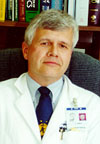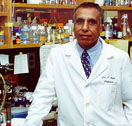Clinical trial for MS drug follows promising research
MUSC will direct a multi-center clinical trial on a drug promising to relieve symptoms and halt the progression of multiple sclerosis (MS).Medical University basic researchers have already shown the efficacy of a class of drugs known as “statins” in reducing brain-damaging inflammation in cell culture and experimental animals.
The clinical trial is designed to determine if one of these medications, simvastatin, is an effective treatment for MS.
 Dr.
Lyndon Key
Dr.
Lyndon Key
“This is an extremely promising drug,” said Lyndon Key, M.D., principal investigator for the trial and professor of pediatrics at MUSC.
Simvastatin is a common cholesterol-lowering drug. It is registered in 117 countries, and more than 20 million people have been treated with the drug. It offers advantages over medications currently taken for multiple sclerosis which are administered by injection and may cause side effects in a significant number of patients. Simvastatin is administered orally and has minimal side effects. In addition, it is much less expensive.
MS patients will be enrolled in the study at the Medical University, Yale University and the University of Colorado's Denver Health Sciences Center.
Thirty patients (10 at each site) with active brain lesions will be enrolled in the treatment phase of the trial. They will take the drug daily for a six-month period, while a series of MRI scans will allow the investigators to observe a reduction or changes in the lesions. It is an open labeled clinical trial with all participants given active medication.
Key is conducting the trial in conjunction with MUSC's Clinical Innovation Group, which designs the study, centrally manages the research at each institution, and collects and evaluates data. Each site has a designated clinical principal investigator for the study site. William Tyor, M.D., director of the MUSC Multiple Sclerosis Clinic, will be clinical principal investigator for the MUSC site; Timothy Vollmer, M.D., director of the Yale University Multiple Sclerosis Research Center, for the Yale University site; and John Corboy, vice chairman of neurology at the University of Colorado Health Sciences Center, for that site.
“This project is an excellent example of an academic medical center at its best,” said Medical University President Ray Greenberg, M.D., Ph.D. “Important research at the basic science level has been carried out in the laboratories of our institution. This research has gone through rigorous peer review, and the results were published in scientific journals. Based on those results, our own faculty members with expertise in clinical research have developed a national clinical trial to test the laboratory findings on patients who would likely benefit.”
Multiple sclerosis usually begins in early adulthood with symptoms varying in severity and duration. Remissions are common in early stages of the disease. Blurred or double vision, inflammation of the optic nerve, muscle weakness and dizziness are some of the initial symptoms. In later stages, patients may endure paralysis, blindness and incontinence. Some 350,000 people in the United States have multiple sclerosis.
In multiple sclerosis, inflammatory cells enter the brain and start activating brain cells to produce a variety of toxins that damage myelin sheaths that surrounds nerves. This may prevent the transmission of messages between the brain and the rest of the body. When the transmission is blocked, the messages may be slowed or blocked, causing diminished or lost function.
“We don’t know what causes the initial insult in multiple sclerosis, but we do know that the damage is caused by inflammation,” Key said. “The process can be compared to a computer key and the resulting letter that comes up on your monitor. You can press the computer key, but if the internal working of your computer is disrupted, the letter would not appear on your screen.” Patients with MS experience an insult to the body, and their brain cells becomes damaged due to inflammation. There are intermediary biochemical events required to cause the inflammatory response.
In earlier laboratory work led by Inderjit Singh, Ph.D., statin drugs were found effective in interrupting these intermediary biochemical events and thereby blocking the activation in the inflammatory cells.
 Dr.
Inderjit Singh
Dr.
Inderjit Singh
Singh is a professor of pediatrics and cell biology and anatomy at MUSC. “Dr. Singh's work has groundbreaking implications, not just for multiple sclerosis, but for a variety of other conditions such as stroke, trauma and Alzheimer’s disease, which are also triggered by an inflammatory response,” Key said. “His work in treating multiple sclerosis in a laboratory animal model with simvastatin showed remarkable results and was the impetus for this clinical trial. His earlier work with another statin drug in both culture cells and another disease model was published in major scientific journals and was an important stepping stone for the current trial.”
The Medical University has received an unrestricted medical school grant
from Merck & Co. for this research.
Criteria for inclusion in the study include clinically definite
MS, 18 - 55 years of age, more than one documented relapse within two years
entry, contraception in females with reproductive potential, EDSS score
0 - 5.5.
Patients interested in enrolling in the trials should contact Ingrid
Ingram, project manager with The Clinical Innovation Groups, at 843-876-1264.